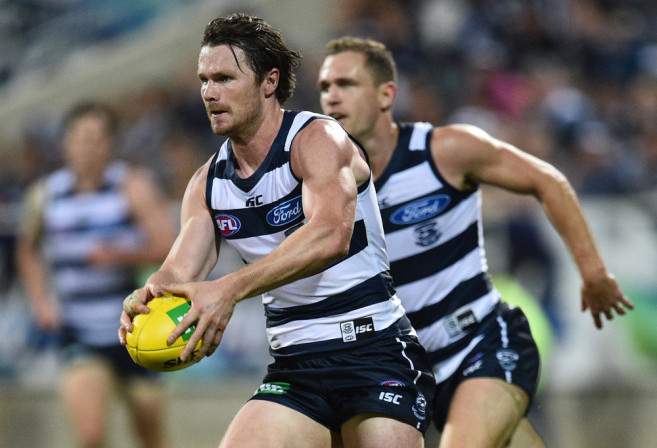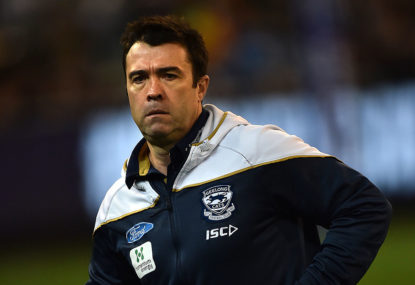Geelong Cats coach Chris Scott is expected to be re-signed by Geelong Cats CEO Brian Cook sometime during the 2017 pre-season.
From the outside, most would consider this to be an obvious move considering Geelong’s relative success.
As a mate who supports Essendon recently said to me, “they’re always up there”. And this could be the position of many outsiders.
But to many Geelong supporters, this is anything but an obvious move and not since perhaps Gary Ayres has there been a coach that divides opinion as much in the supporter base.
Scott came to Geelong with an ominous task – push for a flag in the first year then rebuild for a shot at a flag again in 2015/16.
As Brian Cook put it back in 2011, “we didn’t want a coach who didn’t think we could make the grand final this year … But we also wanted someone who could demonstrate he could lead the rebuilding of the list to make a big impression again by 2015-2016.”
Scott tinkered a little bit from the outside while the senior players drove a change in the game plan that would lead Geelong to a famous premiership in 2011 against what many thought was an unbeatable Collingwood team.
Unfortunately though, it wasn’t the 2011 triumph that would come to define Scott’s era in charge; it would be the elimination final in early September the following year that would give Geelong supporters the first insight into Scott’s Cats.
On September 8th, 2012, Geelong trotted on to the MCG the reigning premiers, playing an elimination final against Fremantle. The Dockers were a team that had hardly won a final let alone a premiership, and had never come close to winning a final at the MCG.
Amazingly, in less than a quarter and a half Geelong hadn’t just lost the match. They had been destroyed by an interstate team, embarrassingly trailing by nearly 50 points – 51 to 3 mid-way through the second quarter.
Geelong were stifled, being completely routed around the contest. On the few occasions they won the ball, they were unimaginative kicking it up the line to a contest or rushing it on to their boot. The players were slow, and showed zero passion.
This shaky start would be a blueprint for the first half of many finals to come under Chris Scott and in the next five years despite finishing top four three times, Geelong would win just two finals of eight.
One of them came against a team of kids Port Adelaide threw on the MCG in 2013, and the other after Isaac Smith missed a relatively easy set shot on goal after the siren last year.
Most expected Geelong to drop, but they didn’t fall away. The Cats kept making finals but doing nothing in them, and as the years went by people wondered when the rebuild would come and why the kids weren’t coming along as had been expected. Then the 2015 season arrived.
Geelong hit the crossroads in season 2015. In Chris Scott’s fifth year at the held, the run of being at the top would come to an end, finishing tenth. Geelong’s lack of quality youth exposed for all to see.
Finally Geelong would go back to the Bomber Thompson rebuild blueprint that had worked all those years ago… but Scott and the club had other ideas.
For years, Geelong supporters had become used to the same old problems with Scott’s Cats. They couldn’t win finals, always lost after the bye, would bomb it on to Tom Hawkins’ head blindly again and again, would lack pace, and would go missing against the lower teams on the ladder, and now at the end of 2015 they’d recruit more mature age players again to top up the list – the traditional rebuild wouldn’t come.
On September 23rd 2016, Geelong again trotted on to the MCG against an interstate team in a final, this time a preliminary final against Sydney, and this time they’d have their marquee signing for 2016 and best player in the game, Patrick Dangerfield, starting in the middle.

There’d be ‘no excuses’, as Scott had said before the game.
Anticipation built as the siren went and the umpire approached the centre circle for the first bounce.
15 minutes later, Geelong had lost. Again blown away on the MCG in a final, again they looked slow, again they were destroyed around the contest early, again they looked unimaginative in their play. When they did win the ball, they bombed it long up the line or threw it on the boot, again they repetitively kicked the ball on to Tom Hawkins’ head while he was outnumbered, and again most importantly they played without passion.
It was a bleak echo of that elimination final back in 2012.
It’s now the pre-season of 2017 and most likely Chris Scott will soon be re-signed, the traditional rebuild never came and Geelong supporters sat back in the 2016 finals and watched the Western Bulldogs, a team that rebuilt by following Geelong’s old blueprint for success, win twice as many finals in 2016 alone as Geelong has in five long years.
St Kilda and Melbourne who’ve both also rebuilt the traditional way hover on the horizon for finals success in 2017.
Geelong’s only had one season in Scott’s reign where they’ve missed the top eight, and Scott has the best season coaching record of all time. But AFL success is not about season records.
And what of Geelong 2017? For mine, we’ll most likely make finals again but not be a real contender, but will we still be slow? Will we still kick it long on Hawkins’ head too often? Will we still put in poor performances against lower teams? Will we lose post-bye? Will our developing players still not come on like we expect?
Will anything change? And that’s the problem you see with Scott’s coaching, things don’t change! In games they don’t change because he says he doesn’t believe in changing much during a game, season to season they don’t seem to change, and in finals they don’t change.
The only confident statement I can make about Chris Scott’s Cats in 2017 is to say this: the more things change the more they’ll stay the same.
But if 2017 doesn’t change then it’s time for Scott to go.






























































































